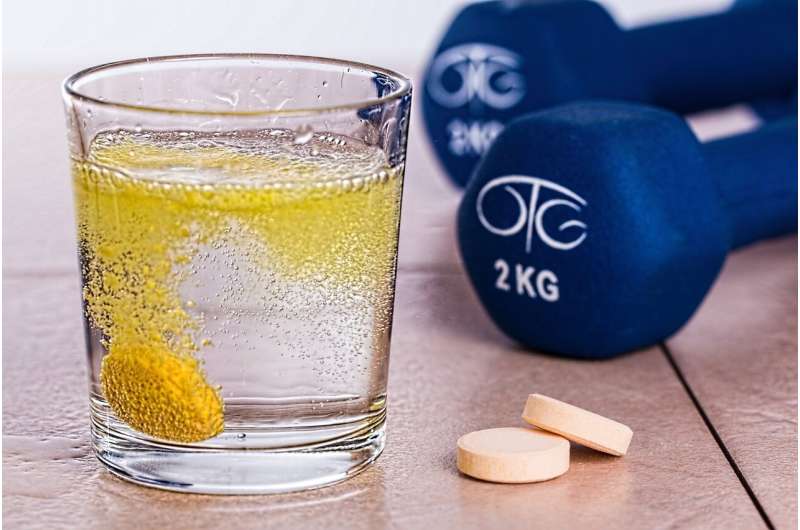
What is actually in a sports supplement? It might be assumed that whatever is on the label reflects what people swallow. Supplement manufacturing is not monitored, and according to a recent study, the reality can be quite different.
Scientists at Cambridge Health Alliance, Massachusetts; Harvard Medical School, Massachusetts; University of Mississippi; and NSF International, Michigan, have analyzed the ingredients in a selection of sports supplements purchased online with liquid chromatography–quadrupole time-of-flight mass spectrometry and discovered 89% to be inaccurately labeled, and 12% included unlabeled banned drug substances.
In the paper, "Presence and Quantity of Botanical Ingredients With Purported Performance-Enhancing Properties in Sports Supplements," published in JAMA Network Open, the researchers detail their findings of erroneous labeling and dangerous ingredients.
Fifty-seven products were analyzed containing one of five popular supplements, R vomitoria (n=13), methylliberine (n=21), turkesterone (n=8), halostachine (n=7) and octopamine (n=8).
Twenty-three of the products (40%) did not contain a detectable amount of the labeled ingredient. Of the 34 products that contained detectable amounts of the listed ingredient, the actual quantity ranged from 0.02% to 334% of the labeled quantity. Only six products (11%) contained an ingredient quantity within 10% of the label.
Seven of the products (12%) were found to contain at least one FDA-prohibited ingredient. Five different FDA-prohibited compounds were found, including four synthetic simulants, 1,4-dimethylamylamine (DMAA), deterenol, octodrine (DMHA), oxilofrine and omberacetam. Six products contained one of these prohibited ingredients, and one contained a combination of four prohibited ingredients.
What are these added drugs?
1,4 Dimethylhexylamine, or 1,4-DMAA, is an analog of 1,3-DMAA which, according to the FDA, is an amphetamine derivative that can raise blood pressure and lead to cardiovascular problems including shortness of breath, chest tightening and heart attack.
Deterenol is a synthetic stimulant, also known as Betaphrine. Deterenol is banned in most countries and not approved for use in humans in the US. Supplements containing deterenol have been linked to adverse events such as nausea, vomiting, sweating, agitation, palpitations, chest pain, and cardiac arrest.
Octodrine is a discontinued nasal decongestant first developed in the 1940s. While poorly studied, reported side effects include hypertension, dyspnea and hyperthermia.
Oxilofrine is a pharmaceutical stimulant developed to stimulate the heart and increase blood pressure. It has never been approved for use in the U.S. as a prescription drug, let alone as an unregulated dietary supplement. Oxilofrine has been linked to severe adverse events, including vomiting, agitation, and cardiac arrest.
Omberacetam is an odd one to find mixed into the list of stimulants as it is a nootropic analog of piracetam, a drug not approved in the U.S. but used elsewhere to treat traumatic brain injury, dementia and various cognitive impairments. Adverse effects of piracetam at pharmaceutical dosages include anxiety, insomnia, agitation, depression, drowsiness, and weight gain.
Despite the many health and wellness claims surrounding supplements, they are not covered under the strict regulatory rules regarding dose-specific medications. Instead, the US Food and Drug Administration (FDA) lists them as a food subcategory. As seen in this study, the synthetic drugs being slipped into supplements are not food or botanical ingredients—they are unapproved pharmaceutical drugs.
The FDA has the authority to take action against any adulterated or misbranded dietary supplement product after it reaches the market. Usually, this action is a request to recall and destroy products. Past actions have found many repeat offenders, and the difficulty in regulating these products is evident when the ingredients the manufacturer lists on the label do not match what they put in the bottle.
Supplement companies are responsible for evaluating the safety and labeling of their products before marketing to ensure that they meet all legal requirements. The U.S. Department of Justice has previously charged individuals with conspiracy to defraud consumers and the FDA by selling products labeled as dietary supplements that contained unapproved drugs.
Finding unlabeled and unapproved drugs in supplements is equivalent to experimenting on humans without their knowledge. Most concerning is the product found to contain four different drug compounds. While none of these drugs are well tested on humans, a cocktail of multiple combined banned substances has never been tested in any scenario.
More information: Pieter A. Cohen et al, Presence and Quantity of Botanical Ingredients With Purported Performance-Enhancing Properties in Sports Supplements, JAMA Network Open (2023). DOI: 10.1001/jamanetworkopen.2023.23879
© 2023 Science X Network
Citation: Researchers find 89% of sports supplement labels false, ingredients fraudulent and some laced with illegal drugs (2023, July 25) retrieved 25 July 2023 from https://ift.tt/wIE7Nfa
This document is subject to copyright. Apart from any fair dealing for the purpose of private study or research, no part may be reproduced without the written permission. The content is provided for information purposes only.
"ingredients" - Google News
July 25, 2023 at 07:57PM
https://ift.tt/F4DzL7H
Researchers find 89% of sports supplement labels false, ingredients fraudulent and some laced with illegal drugs - Medical Xpress
"ingredients" - Google News
https://ift.tt/TPSq9w4
Shoes Man Tutorial
Pos News Update
Meme Update
Korean Entertainment News
Japan News Update
Bagikan Berita Ini














0 Response to "Researchers find 89% of sports supplement labels false, ingredients fraudulent and some laced with illegal drugs - Medical Xpress"
Post a Comment